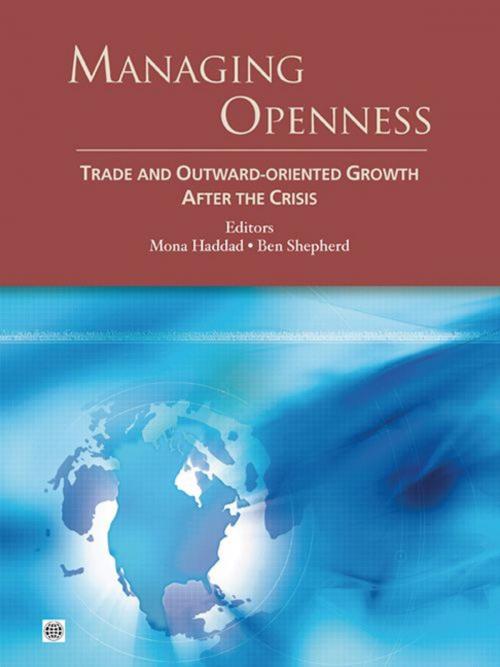Managing Openness: Trade and Outward-Oriented Growth after the Crisis
Business & Finance, Economics, Economic Conditions| Author: | Haddad Mona; Shepherd Ben | ISBN: | 9780821386330 |
| Publisher: | World Bank | Publication: | March 22, 2011 |
| Imprint: | Language: | English |
| Author: | Haddad Mona; Shepherd Ben |
| ISBN: | 9780821386330 |
| Publisher: | World Bank |
| Publication: | March 22, 2011 |
| Imprint: | |
| Language: | English |
The global financial crisis triggered a broad reassessment of economic integration policies in developed and developing countries worldwide. The crisis-induced collapse in trade was the sharpest ever since World War II affecting all countries and all product categories. A huge shock to the trading system combined with severe macroeconomic instability makes it natural for policymakers to call into question the basic underlying assumptions of trade liberalization and openness. In particular outward-oriented or export-led growth strategies are being reassessed as openness is increasingly associated with greater volatility. However it is crucial not to lose sight of the dynamic benefits that openness can offer. Examples include technology transfer increased competitive pressure that reduces markups and improves efficiency and economies of scale. The real question is how to manage outward-oriented strategies so as to maximize the benefits of openness while minimizing risks. This book aims to contribute to this important and ongoing policy debate bringing together recent empirical work on the trade collapse its causes and consequences and the broader trade policy agenda in the post-crisis environment. It addresses critical policy issues revolving around the topic of outward-oriented growth strategy including policy instruments that help manage risks associated with outward-orientation lessons learned from the crisis for particular countries and regions and how emerging trade policy issues such as climate change commodities global production networking and migration affect the prospects for recovery and outward-oriented growth.
The global financial crisis triggered a broad reassessment of economic integration policies in developed and developing countries worldwide. The crisis-induced collapse in trade was the sharpest ever since World War II affecting all countries and all product categories. A huge shock to the trading system combined with severe macroeconomic instability makes it natural for policymakers to call into question the basic underlying assumptions of trade liberalization and openness. In particular outward-oriented or export-led growth strategies are being reassessed as openness is increasingly associated with greater volatility. However it is crucial not to lose sight of the dynamic benefits that openness can offer. Examples include technology transfer increased competitive pressure that reduces markups and improves efficiency and economies of scale. The real question is how to manage outward-oriented strategies so as to maximize the benefits of openness while minimizing risks. This book aims to contribute to this important and ongoing policy debate bringing together recent empirical work on the trade collapse its causes and consequences and the broader trade policy agenda in the post-crisis environment. It addresses critical policy issues revolving around the topic of outward-oriented growth strategy including policy instruments that help manage risks associated with outward-orientation lessons learned from the crisis for particular countries and regions and how emerging trade policy issues such as climate change commodities global production networking and migration affect the prospects for recovery and outward-oriented growth.















